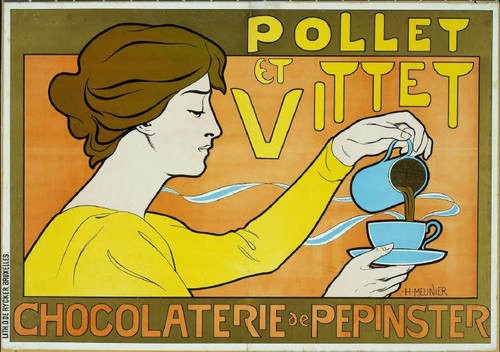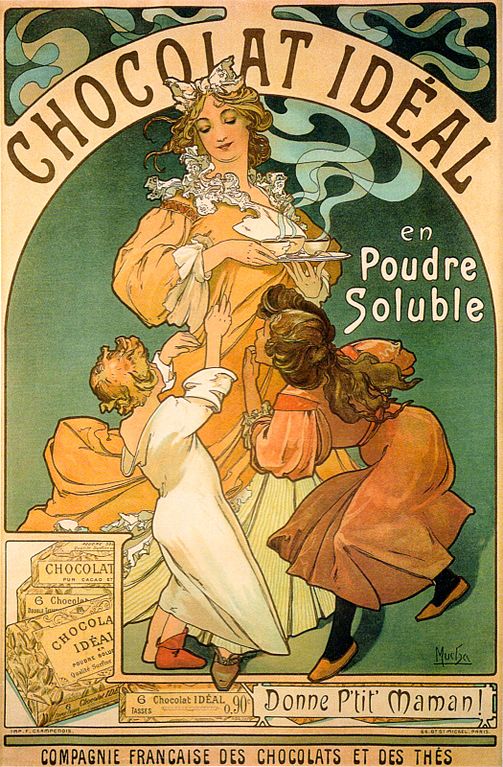
A book newly acquired by the Thammasat University Library helps us understand the importance of the chocolate industry in Thailand.
Nestlé: 125 years, 1866-1991 describes the history of the multinational food and beverage company based in Vevey, Switzerland which is considered the largest food company in the world in terms of income. In 2011, it was ranked first in the Fortune Global 500 as the world’s most profitable corporation. Nestlé has over 400 factories in almost 200 countries. While today Nestlé manufactures many different kinds of items, including baby food, bottled water, breakfast cereals, coffee and tea, ice cream, and pet food, it is perhaps most famous for its chocolate products. Yet the company originated in the 1860s as an effort to sell condensed milk and infant formula to nourish babies. It is named in honor of one of the original founders, the Swiss manufacturer Henri Nestlé. The company’s public image in Thailand started in 1893, with an advertisement for Milkmaid sweetened condensed milk in the Bangkok Times. Now the Nestlé Group Thailand employs 2,800 workers in six plants. Among the brand names manufactured and distributed in the Kingdom by Nestlé (Thailand) Ltd. are such well-known products as Nescafé and Coffee-Mate.
Thailand and Chocolate
According to an analysis published in April of market trends and future market growth for the chocolate industry in Thailand by Euromonitor,
Chocolate consumption in Thailand remained relatively low compared to other countries. Thais tend to consume chocolate on an occasional basis rather than daily. Many prefer to consume sugar confectionery, bakery products, or sweet and savoury snacks more than chocolate confectionery due to lower price points and more suitable to local preferences. However, leading brands continued to perform ongoing product innovation, marketing activities and promotions to stimulate chocolate consumption which help sustain overall volume growth and retail value growth at 7% and 11%, respectively in 2014.

The report notes that Nestlé (Thailand) Ltd. remained the leader in chocolate production in Thailand last year with 23% of the national market, producing such candies as Kit Kat, Smarties, and others. Using promotional deals for buying Kit Kats at 7-Eleven stores, Big C, and Tesco Lotus, the company boosted sales last year.
Euromonitor predicts that in Thailand,
Chocolate confectionery is likely to maintain healthy growth over the forecast period as driving by on-going marketing activities, new product innovation, and advertising of multinational operators. Value growth will likely grow stronger than volume growth due to the increased demand for premium brands which continue to make a strong penetration in modern retail channels.
Premium-quality chocolates in the Kingdom
Among the smaller companies offering higher-priced chocolates in malls around Bangkok is Melt Me Chocolate, a Thai-owned and operated company that specializes in what it calls Hokkaido Dark Chocolate. The reason a Thai company has named a product after a Japanese city is that Hokkaido, a northern island of Japan, is known for its dairy farms and chocolate manufacturing. Melt Me is run by Sunisa Passakornnatee, who is married to Tan Passakornnatee, a Thai businessman who founded the Oishi Group of Japanese restaurants which sells Oishi Green Tea. Khun Sunisa spent three months studying chocolate making in Japan. She uses cocoa from Belgium and France in such products as Hokkaido Green Tea Chocolate.

The media has discussed the possible health benefits of some kinds of dark chocolate, which if eaten in moderation can help heart function. Also, if chocolate is high-priced, adults tend to eat less of it than the lower-priced variety, so that can also be an advantage. Another company offering premium chocolates to foodies in Bangkok is Gallothai. Founded in 1993 by Paul Graindorge, a Belgian chocolate-maker, these products are in the tradition of Belgium. Now the company is run by the founder’s son, Jean-Louis Graindorge. Gallothai chocolates are served in many local hotels and restaurants and sold in the Duc de Praslin chocolateries in Bangkok, Phuket, Chiang Mai, and Pattaya.
In 2012, Jean-Louis Graindorge told The Nation newspaper that as managing director of Puratos (Thailand), a subsidiary of the Belgium-based Puratos Group, a major producer of chocolate and baking ingredients, will double its Thai manufacturing by this year to market to ASEAN countries, Japan, and China. Japanese consumers love chocolate, buying about 90,000 tons of it annually, and Thailand is a leading supplier of high-quality chocolate compound. By contrast, Thailand consumes only about 30,000 tons of chocolate each year, as of 2012, with further growth expected.

Thai lovers of chocolate.
The chef Win Singaphatanakul, like many Thai readers, was influenced by the 1999 novel Chocolat by Joanne Harris, about a young Frenchwoman who opens a chocolate shop in a small town in France, and helps many local people. The TU Libraries own a copy of the translation into Thai language of Chocolat as well as an MA thesis, An Analysis of Cultural Terms in the Thai Translation of ‘Chocolat’ by Chalisa Junmukda. As yet the library apparently does not own the original English-language version of the novel or its popular film adaptation from 2000, starring Juliette Binoche. Using these sources as inspiration, as he told The Nation in 2012, Win Singaphatanakul opened a dessert bar and bistro, I Love You II. There he imports chocolate and cocoa from France and Switzerland.
Following these trends, last year a branch of the noted Swiss chocolatier Teuscher opened at Central Embassy and Chocolate Boutique was featured in the lobby of Bangkok’s Shangri-La Hotel. Outside of Bangkok, the fashion for high-end chocolate can also be found. The chef Namnueng Eamcharoenying has opened Chocolate Factory on Thanarat Road in Nakhon Ratchasima, not far from Khao Yai National Park. One feature for customers is that they can see how the delicacies are made in the kitchen.

(all images courtesy of Wikimedia Commons).
